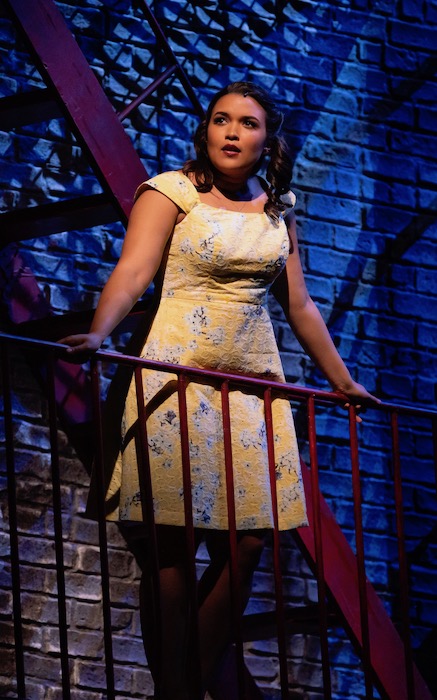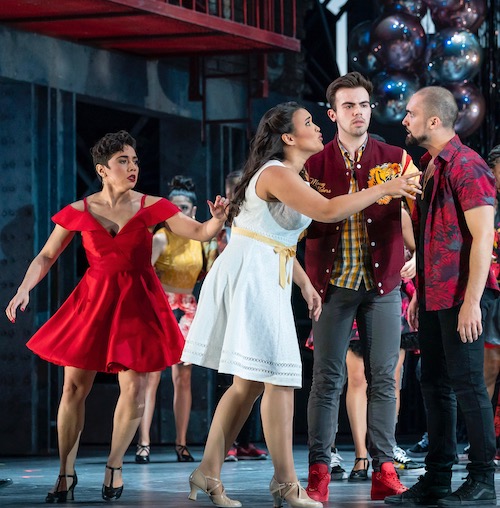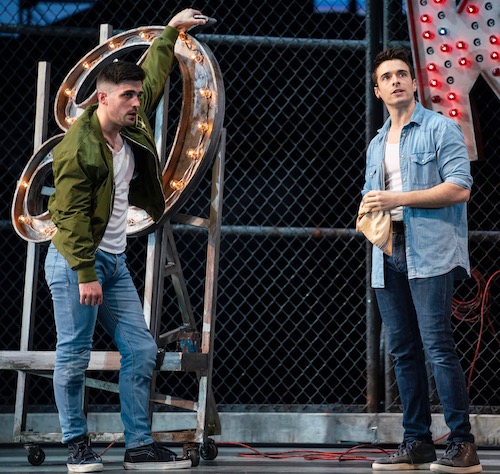A star-making performance and Bernstein’s magnificent score boost Lyric Opera’s “West Side Story”

At the end of the Quintet at Saturday’s opening-night performance of West Side Story, Mikaela Bennett as Maria cut loose with a gleaming final top note that soared over the entire ensemble, delivering one of the most thrilling vocal moments heard at Lyric Opera all season.
The company is presenting Leonard Bernstein’s Broadway classic as its spring musical this year. And, while not quite everything worked in Francesca Zambello’s production, the singing, dancing and musical values were consistently outstanding, making Lyric Opera’s colorful and exuberant West Side Story an inspirational coda to the 2018 Bernstein centennial celebration.
American musical theater was changed forever on September 26, 1957 when West Side Story opened at the Winter Garden Theatre in New York. With a book by Arthur Laurents, choreography by Jerome Robbins and lyrics by a young Stephen Sondheim, the brilliant and audacious scenario updated Shakespeare’s Romeo and Juliet to contemporary New York tenement slums, with the two-star-crossed lovers caught between warring American and Puerto Rican street gangs.
As extraordinary as all the creative elements were—not least Robbins’ remarkable mix of balletic elegance and punchy modern-dance vitality— it is Bernstein’s magnificent score that makes West Side Story the greatest of all American musicals. While there are inspired moments in Candide and worthy sections in his Serenade and Second Symphony, West Side Story remains Bernstein’s masterpiece, with music that is tough and cynical, edgy in its jazzy syncopations, yet melodically rich, beautiful and heart-breaking, a show that remains fresh, moving and effective today 62 years after its premiere.
A coproduction with the Glimmerglass Festival and Houston Grand Opera, Zambello’s staging is faithful to the original production and mostly successful for that reason. Crucially, she uses Robbins’ original choreography, recreated here with high-stepping vitality by Julio Monge.
The dance sequences were glorious, put across with grace and dynamic energy. The Dance at the Gym proved electrifying in its rhythmic punch and sonic and visual impact, while “Cool” was equally arresting for its jazzy bite and aggressive defiance.
Yet when the music and dancing stopped, things became more dicey and this opening-night performance felt on shakier ground.
Reflecting the current trend in musical theater, Zambello’s direction seemed like she was attempting to set a land-speed record in trying to get through dialogue as quickly as humanly possible. Whether trying to establish strong dramatic momentum or stave off any perceived audience boredom, the hyper-caffeinated pace felt far too rushed and frenetic at times. Even the balcony scene between Tony and Maria felt hectic and hurried along, as if trying to get quickly through all of that boring love talk to get to “Tonight.” Overall, there was a lack of a sense of breadth and space for the story’s quiet and more intimate moments to open up and breathe.
Similarly, in the opening scenes it seemed like everyone was trying too hard and shouting their lines, with the Jets unable to deliver a sentence without punching each other in the shoulder (one of many overdone bits of physical stage business). Laurents’ cynical streetwise humor mostly fell flat with some of the funniest lines either lost by being garbled or rendered leaden by emphatic crotch-grabbing gestures.
Fortunately, the musical elements made up the balance.
Leading the cast was Mikaela Bennett in a star-making performance as Maria. Only a year out of Juilliard, Bennett won acclaim for her 2018 title role creation in Michael Gordon’s offbeat opera Acquanetta.
Bennett is blessed with a sensational soprano voice that fits the music and character of Maria like a well-tailored glove. Fresh, radiant, pure of tone and flexible with secure top notes, there is a youthful innocence in her very timbre. When she began singing “Tonight,” all doubts about the production flew away (like the world in Sondheim’s lyrics). Her vocalism was a pleasure to the ears throughout, not least in her vivacious, “I Feel Pretty” and lovely rendering of “Somewhere” (wisely given to Maria in this production rather than “A Girl” offstage, as in the original.).
Dramatically, some of Bennett’s physical gestures occasionally seemed mannered and overdone, like her quivering hands. Yet she was largely convincing painting her character’s arc, charting Maria from a girlish teen to a woman deeply in love, and a broken victim of gang violence at the end of the evening. Bennett brought a scary intensity to Maria’s final anguished outburst of anger and emotional breakdown.
As Tony, Maria’s doomed beloved, Corey Cott’s mixed performance felt decidedly like a work in progress opening night. The young actor seemed nervous in the opening minutes, his solidly sung “Something’s Coming” undone by distracting, over-elaborate arm gestures, as if offering a simultaneous semaphore version as a bonus. “Maria” went better, sweetly sung with a warm light tenor and the soft high final notes nailed. Cott’s voice blended gratefully with Bennett’s in “One Hand, One Heart.”
Cott was most uneven as an actor, his soft-grained Tony making it hard to believe that this guy had ever been a Jets gang member. Zambello’s rushed and haphazard direction of the balcony scene didn’t help with Cott’s casually awkward “I love you” to Maria eliciting laughter opening night. (Romantic scenes are not Zambello’s strong point.) Cott did bring emotional intensity to the final scene when he thinks Maria has been killed, though some of his desperate cries were on the shrieky side.

Amanda Castro was a superb and sassy Anita, Maria’s friend and girlfriend to her brother Bernardo. A wonderfully flamboyant dancer, Castro sang admirably, leading a feisty “America,” and brought daunting rage to the role when Anita is molested by the Jets while attempting to warn Tony.
Equally versatile was Brett Thiele as Riff, leader of the Jets and Tony’s best friend. Robust of voice and a credible actor, Thiele is a terrific dancer, pulling off astounding acrobatic somersaults in the Dance at the Gym that even rival Russ Tamblyn in the movie.
As his Sharks counterpart, Manuel Stark Santos etched an imposing portrayal of Bernardo, and was also strong dramatically and as a dancer.
The rest of the Jets (Adam Sniak as Action, Taylor Simmons as A-Rab, Jarred Manista as Baby John, Wesley Ryan as Big Deal, Jeffrey C. Sousa as Diesel, Paul HeeSang Miller as Gee-Tar and Juan Caballer as Tiger) were a lively, big-voiced group and excellent dancers, if more clownishly boisterous than genuinely funny in “Gee, Officer Krupke.” Alexa Magro was aptly tomboyish as the Jet wanna-be Anybodys.
The Sharks (Julio Rey as Chino, Mark Deler as Pepe, Joshua Lamar as Indio, Joseph A. Hernandez as Luis, Greg Blackmon as Anxious, Michal J. Rio as Nibbles, Martin Ortiz Tapia as Juano and Sebastian Garcia as Toro) sang and danced just as well while playing the Puerto Rican gang at a less frantic level, and were the better for it.
Their girlfriends proved equally agile and colorful led by Kyra Sorce (Graziella), Veronica Sofia Burt (Velma), Linedy Genao (Rosalia), Alexandra Matteo (Consuelo) and Addie Morales (Francisca).
The supporting non-musical roles were well taken by all. Bret Tuomi made an odious Lieutenant Schrank, and Jerry Kernion an equally loutish Officer Krupke. David Alan Anderson was a humane Doc, and Ed Kross an amusingly ineffectual Glad Hand.
Peter J. Davison’s revolving sets are traditional and largely effective—enclosed by ominous metallic scaffolding with prison-like fencing and overhead highway for the rumble, minimalist furniture and backward neon for Doc’s drugstore, and colorful festooned balloons and lights for the Dance at the Gym. Less successful was having Maria’s bedroom high atop a bilevel platform—a decidedly tiny and cramped space for “I Feel Pretty” and far too distant from the audience for Maria’s crucial Act II scenes with Tony and Anita.
Jessica Jahn’s costuming is a stylish mix of period and contemporary youthful anti-social cool. The amplification sounded well opening night with dialogue clear yet not overwhelming in volume, and voices effectively balanced over the orchestra.
Apart from a too-quick leap into “I Feel Pretty,” which had Mikaela Bennett scrambling to catch up, James Lowe’s conducting of this score was virtually faultless. He brought fine romantic warmth to “Somewhere,” One Hand One Heart” and Tonight” and crackling energy and high-stepping panache to the dance episodes.
The pit ensemble, composed largely of Lyric Opera Orchestra musicians, showed impressive versatility at morphing into a crack Bernstein band. A couple early entrances and an ill-tuned violin solo apart, the players brought great lyric ardor to Bernstein’s soaring ballads, and fizzing drive and rhythmic incisiveness to the dances.
West Side Story runs through June 2. lyricopera.org
Posted in Performances







Posted May 06, 2019 at 6:34 pm by Mike
Those “big voices” you refer to were members of the Lyric Opera chorus surrounded by an offstage mic to bolster the sound of the mostly dancer cast.
Posted May 08, 2019 at 1:30 am by Donald Nathan
Cynical, garbled, frenetic, mannered, overdone, nervous, distracting, light, awkward….these words are all found above in reflecting the acting and singing of the cast. This is NOT regional theatre. This is the Lyric Opera of Chicago.
That said the dancing is spectacular, the orchestra a treat to hear and the augmented singing from the Lyric Opera Chorus much appreciated and exciting. However, as Bernstein’s opus offering with phenomenal melodies and tunes originally sung on Broadway by accomplished singers (Kert and Lawrence and Rivera…check out the Broadway cast album) it falls a bit FLAT.
If you want a wonderful dance/orchestral you may be pleased. If you want a fantastic vocal offering, you might be disappointed especially at these prices.
Posted May 10, 2019 at 2:30 pm by Charles Brown, III
This review was very helpful as we prepare to enjoy the May 22nd performance. It was very detailed and balanced. Thank you!
Posted May 11, 2019 at 1:29 am by Lena
Donald Nathan – I agree completely with your comment. Although there were many admirable elements, this was not, in my opinion, a production worthy of presentation at the Lyric Opera.
Posted May 17, 2019 at 10:18 am by Jenny
Attended the May 16 performance and was terribly disappointed from start to finish. The rushed pacing and shouting of all spoken lines ruined the production. With the mics there no need for shouting. A great example is Cool, a song about playing it “cool” but every admonition was shouted. The review was right to point all this out. However, the musical numbers did not make up for it. With all the dialogue being so rushed and always shouted the result was no story, no drama, no pacing, no reason to feel for the characters.
Agree wholeheartedly on Tony, except for the praise for his performances of Something’s Coming and Maria. The stiffness of the phrasing and timing ruined those numbers for me despite his beautiful vocal quality.
And the orchestra was a disappointment. Surprised to hear it was mostly Lyric players. The brass and percussion too loud and the strings too soft. Overall it sounded bombastic and amateurish. Not the sublime level of playing experienced at Lyric opera performances. And the soft moments suffered too. The gorgeous string melodies in One Hand One Heart were barely audible. Too many times the orchestra and singers were not in sync at start or end of numbers.
Overall just far below the quality of a Lyric Opera production and not worthy of the price. Perhaps the biggest problem is micing everyone, but then having the cast shout as if there were no mics as in normal Lyric opera productions. Baffling that the choice to shout and rush through all dialogue was allowed.
Posted May 29, 2019 at 11:21 am by Steve -- Bernstein Fan
After seeing the show last night (6/28) I read as many reviews as I could find. This one was the most comprehensive and accurate of them all.
I agree with Donald Nathan’s comments regarding the vocals, and Jenny’s comment, “no drama, no pacing, no reason to feel for the characters.” And I also noticed that the cast and orchestra were not always in sync.
Cott’s rendition of “Something’s Coming” was most disappointing. Aside from excessive vibrato (complete with quivering lower lip), his phrasing was off and lacked necessary emphasis in many places. In general, his portrayal of the male lead was quite weak.
The orchestra was adequate. Although at times the percussion did seem loud, I actually enjoyed hearing drum nuances I had never noticed before. Unlike the rushed spoken dialog, at times the musical numbers were a little slow.
Overall, a very enjoyable performance, if not quite up to the musical bar set by the Broadway cast album.
Posted May 29, 2019 at 3:49 pm by Steve -- Bernstein Fan
In my post above, the date of the performance I saw should have read “5/28”.
Also, I neglected to mention a couple of things….
The sets and lighting were beautiful, especially the twilight skies and the gym. As the review mentioned, however, the bedroom left a couple of things to be desired.
Mikaela Bennett has a very strong voice and her duet with Amanda Castro on “A Boy Like That” was a tour de force!
My general conclusion that it was an enjoyable performance, despite some musical misgivings, was based mainly on the enduring glory of the Leonard Bernstein score and the adherence to the original choreography.